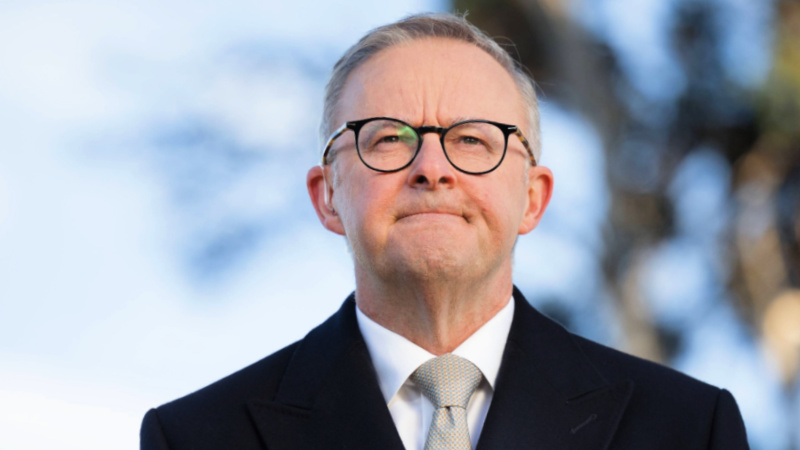The evolution of Albanese: how his foreign policy ideas have changed
November 14 2022

By James Curran and Elena Collinson
Note: This article appeared in The Australian Financial Review on November 14 2022.
At this week’s G20 summit in Bali, Prime Minister Anthony Albanese will sit at one of the top tables in global affairs. It will be the capstone of his first six months at the helm of Australia’s foreign policy.
But it also marks the culmination of a journey from the more rebellious left wing foreign policy of his earlier period in parliament.
Mr Albanese has walked a familiar path for a 21st Century Labor leader – much like Julia Gillard. The idealistic left-wing critic of globalisation and the Iraq War has become a true believer in the American alliance.
Indeed in Albanese’s story lies the account of how Australia, since the late 1990s, has swooned into the arms of the US. Albanese’s conversion came largely through ministerial office, participation in the Australian-American leadership dialogue and powerful memories, old and new, of what happens when Labor is on the back foot on national security.
It is a fair bet, too, that past and present senior US officials, and some Labor elders, the self-appointed guardians of the party’s alliance lore, have also played a role in his conversion.
Few would dispute the solid, if unspectacular, start the Albanese team has made in its carriage of Australia’s engagement with the world.
Where continuity has been demanded – on the Quad, AUKUS and the US alliance – Labor has given willing assent. Where a change in tone was necessary, most clearly on relations with China and the Pacific, it has been expressed.
But it is striking that Mr Albanese has made it to the Lodge with little being known about his views of the world and the context from which they emerged. From the time he became opposition leader in 2019, Albanese’s primary objective was to neutralise strategic policy as a point of difference between the two parties. On taking over from Bill Shorten he characterised himself as a ‘mainstream politician’, including on foreign affairs.
Mr Albanese did not want to pick a fight with Scott Morrison on national security. It revealed the hold of old Labor fears from the Cold War, when former leaders H.V. Evatt and Gough Whitlam fell foul of American presidents and their officials. Mark Latham’s defeat in 2004 underlined the ongoing potency of the issue, when the party was deemed untrustworthy on the US alliance owing to Latham’s call to bring Australian troops home from Iraq at the end of 2004.
Mr Albanese’s abiding interests in politics have, of course, been essentially domestic.
But from 1996, when first elected to the federal parliament, he has had to respond to and speak on a wide range of international issues.
Fire in the belly
In the late 1990s, it was on the question of globalisation and human rights where Albanese first started to enunciate how he thought about the world. Globalisation was ‘not yet complete or beyond regulation’, he told the parliament in August 1999, adding that he was no subscriber to the ‘‘I’m all right, Jack, forget everybody else’ school of international order that sees no role for the nation state in trade or investment policies.’
With fire in the belly, he assailed unchecked globalisation that ‘offers no protection for working people’ and proposed the revival of a tax on international financial transactions to fund development projects and curb currency speculation. The idea had first been introduced by Nobel Laureate economist James Tobin in 1978. Albanese also wanted a social clause linked to the WTO to enshrine core labour standards and protect basic human rights.
In September 1999, after prime minister John Howard committed Australian military forces to assist in the restoration of security in East Timor following its vote for independence, Albanese joined in the criticism of bipartisan policy up until that point. It had been open season on the Whitlam/Fraser/Hawke/Keating consensus that the relationship with Jakarta should not be held hostage to the East Timor issue.
Albanese’s comments echoed the change in Labor policy introduced by then shadow foreign affairs spokesman Laurie Brereton. As Albanese said: ‘The invasion and occupation of East Timor in 1975, the de jure recognition of East Timor as a province of Indonesia a few years after that, and our foreign policy performance in the decades after 1975 in a bipartisan way leave much for us to regret.’
Friend of Palestine
The disadvantaged were on his mind again. In October 2000, Albanese, then secretary of the Australian Parliamentary Friends of Palestine, observed that the ‘Palestinians’ acceptance of the 4 June 1967 borders, which constitute only 22 percent of that which existed prior to 1948, is an extraordinary compromise in the name of peace’.
He was speaking in the wake of the violence that had erupted following Israeli Prime Minister Ariel Sharon’s provocative visit to Haram Al Sharif in late September. Sharon was an ‘extremist’, Albanese said, one who ‘cannot see the world for what it is – a place where not every issue is black and white, where land is a scarce commodity and where many versions of history dictate many differing claims of ownership’.
In that speech, Albanese spoke at length of the death of the 12 year-old Palestinian boy Muhammad Al-Durrah, shot as his father tried to shield him from heavy gunfire whilst attempting to hide behind a concrete block near an Israeli army post. The chilling footage was beamed into living rooms around the world. Albanese criticised the ‘excessive use of force by Israel’, adding that ‘a helicopter gunship is not more moral than a boy with a stone’.
In a later speech, he emphasised the importance of applying pressure ‘where we can to try to redress the repressive policies of the Israeli government and its military and to oppose the extremists of the Palestinian side who engage in terrorism’.
No pacifist
Following the terrorist attacks on Washington and New York in September 2001, Albanese was by no means the only politician around the world to speak up for ‘tolerance and humanity’. Decrying attacks on a mosque in Brisbane, he also called for the international community to be discriminating, punishing only those responsible and ensuring that ‘no more innocent lives are lost to add to the count of murders conducted by the terrorists’.
But it was during the debate over Australia’s commitment to the US-led war in Iraq in 2003 where Albanese showed his true colours, doing so in the strongest terms. Albanese had supported the war in Afghanistan, stressing that he was not a ‘pacifist’.
As it became clearer that the Howard government would join George W. Bush’s ‘coalition of the willing’ in Iraq, Albanese morphed into a realist, attacking the ‘hawks … who have no plan for the future government of Iraq, let alone the rebuilding of the nation or how to deal with the hundreds of thousands of refugees the war will create’.
The war also roused the nationalist within him. His sharp critique of America’s Iraq hawks necessarily widened to include an attack on US unilateralism. Albanese was not sketching out a new position here: like Labor leader Simon Crean, he took his stand on the proposed action’s violation of the collective security principles of the UN Charter.
Albanese was not shy of personalising his lines of attack: both against then US ambassador to Australia Tom Schieffer, and subsequently president Bush himself. When Schieffer questioned the right of Labor members to speak out against the war, Albanese fired back, describing Schieffer’s remarks as an ‘outrage’. The US, he said, ‘undermines its own advancement of democratic institutions if its representatives do not respect the right of elected members to state their views in the parliament of Australia’.
And he mocked president Bush’s ‘repeated invocation of God’, which he believed ‘invites images of a holy war that does nothing except promote an extreme response from Islamic fundamentalists’.
On the Sunday after that speech in Albanese participated in the Walk Against the War in Sydney, a march that attracted greater numbers than the Vietnam moratoriums. And in parliament he repeated a quote popularly attributed to Shakespeare’s Julius Caesar sent to him by a constituent: ‘Beware the leader who bangs the drums of war in order to whip the citizenry into a patriotic fervour, for patriotism is indeed a double-edged sword. It both emboldens the blood, just as it narrows the mind.’
By March the following year, as the Howard government formally announced its military support for the US-led invasion, Albanese’s language sharpened. Given that only three nations were sending troops – the US, UK and Australia – he asked, ‘What does that say about the sort of nation we are? We are a multicultural nation, yet here we are, sending a message, particularly to the Islamic world, that we are a part of the old, white, Anglo-Christian order.’
In case any had missed the point, he added that ‘we should not be revisiting the crusades’.
In this and subsequent speeches, Albanese attacked ‘warmongering’ in Washington and Canberra, the US doctrine of pre-emption, and American militarism. Later, he defended Labor’s call under Latham to bring the troops home by the Christmas of 2004, adding that it had been vindicated because Australia had been ‘led into a war on false pretences’.
By June 2004, Albanese was telling parliament that the Howard government was getting its advice from the ‘shady White House string puller Karl Rove’. Mr Howard, in using ‘our servicemen and women to get him re-elected’, had taken the tactic ‘straight from the neo-con playbook’.
Changing attitude
All this, however, would change. Ministerial office, invitations to the Australian-American Leadership Dialogue and a US presidential visit saw him give voice to a quite different take on Australia’s international personality. When President Obama arrived in late 2011, Albanese as Leader of the House proudly declared that Australia was ‘on display to the world’. Gone was the critique of America’s unilateralism – the alliance had become ‘fundamental to our security and a cornerstone of stability in the Asia-Pacific’.
The change was given its clearest articulation in the concern he expressed in 2015 over the successful bid by Chinese company Landbridge to operate the port of Darwin under a 99-year lease. It was ‘extraordinary’, he told the media, that ‘there was no heads-up given to our ally in the United States’.
He was echoing President Obama’s own complaint to prime minister Malcolm Turnbull over the matter. Albanese depicted the move as a threat to the joint training in northern Australia with US forces. It was a ‘grave error of judgment’, he thundered, to ‘give up a strategic asset to a company that has links with the People’s Liberation Army in China’.
The coming of Trump
The coming of Donald Trump to the White House brought certain, albeit mild, qualifications to Albanese’s American embrace.
By late 2017, he was proudly proclaiming himself to be a long-term member of the Australian-American Leadership Dialogue, though he was at pains to emphasise the meeting’s capacity for polite disagreement between Australian and American delegations and their respective interests. But given Trump’s shocks to the very idea of what America stood for, there was some adjustment required to Albanese’s language about the US.
So he described the country as ‘complex’ and ‘diverse’, recalling his own visit there before entering parliament. That experience had given him a ‘feel for how [America] is a different place from Australia – a different culture’.
And he proceeded to label Trump’s immigration policy, which discriminated on the basis of faith, ‘wrong’ and a policy that ‘damages the integrity of the United States’ – a country, he intoned, that ‘remains a beacon for the world’. Albanese stressed ‘that doesn’t mean we should not look critically’ at America. ‘Supporting the alliance … shouldn’t mean that we are not prepared to put forward Australia’s national interest.’
That might well indicate Albanese remains wary of automatic agreement with Washington, particularly on some of the more hawkish American intentions in Asia.
By the 70th anniversary of the US-Australia alliance in 2021 and with a Democrat back in the White House, the relief at Trump’s demise softened the rhetoric. Albanese welcomed the ‘return of American leadership and the rules-based order’.
He could not bring himself to draw conclusions from the chaotic end to the 20-year war in Afghanistan, only praising the ‘steadfastness of American values’. And he recited Labor’s record on the relationship from the time of World War II. On everything from the Quad to climate change and ASEAN centrality, he saw a confluence of interests.
James Curran is Professor of Modern History at Sydney University. He has previously worked at the Office of National Assessments, and in the Departments of Prime Minister and Cabinet and Defence.
Elena Collinson is a senior researcher at the Australia-China Relations Institute, University of Technology Sydney.


